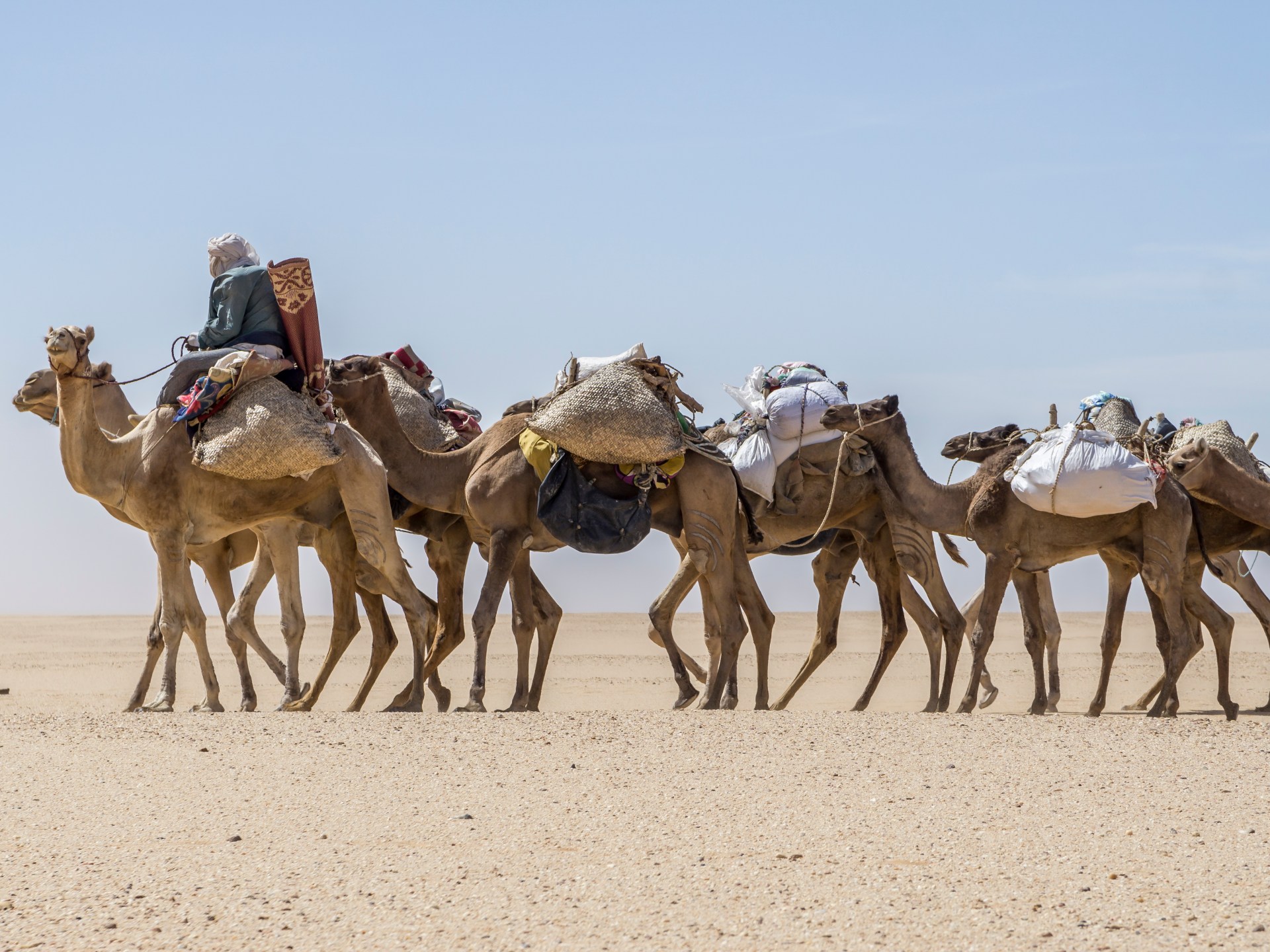Caravan of the Bedouins of the Tebu tribe (Shutterstock)
There are more than 200 tribes and ethnic groups in the country of Chad, most of which extend into neighboring countries (Sudan, Libya, Niger, Nigeria, Cameroon, Central Africa, and South Sudan). There are 130 languages and dialects spread in the country, and the Chadian Arabic dialect is considered the most widespread among the population, while the constitution stipulates that the official languages are French and Arabic.
Among the most prominent of these tribes and ethnic groups are:
Sarah
An ethnic group residing in the southern regions of Chad, its members represent 27.7% of the total population, making it the largest ethnic group in terms of population in this African country, and it has extensions in Sudan and northwest Central Africa.
This group belongs to former President François Tombalbaye, who was the first president to rule Chad after its independence from France in 1960. Sara is distinguished by special traditions, and the ritual of scarring the body is widespread among its members, leaving lifelong scars as an expression of solidarity.
Zaghawa
It includes Presidents Idriss Deby Ethno, who ruled the country for 30 years, and his son Mohammed, who took over the reins of power after his father was killed, and headed the Transitional Military Council.
According to Chadian sources, the Zaghawa tribe experienced an internal conflict after the killing of Déby in April 2021, and one of its manifestations was the attack by the security forces on the headquarters of the Socialist Party and the killing of its president, Yahya Delo Djiro, during the attack. He is the president’s cousin and belongs to his tribe. General Salih Déby, the interim president’s uncle, was also arrested. A member of the opposition party.
The presence of this tribe is concentrated in the northeastern regions of Chad and the far northwest of the Sudanese region of Darfur, and it has had a significant presence in the army since the era of former President Hissène Habré, and this presence was strengthened during the era of Déby.
Tebu
An ethnic group, also called the Gorran, is spread in several regions of Chad, especially the Tibesti Mountains, and represents 6.3% of the total population.
Former President Hissene Habré belongs to one of the Tebu clans, as does his predecessor Bokoni Awedi, in addition to the head of the Front for Change and Accord, Mohamed Mahdi Ali, which is the front that killed former President Idriss Deby during military battles with its fighters in April 2021.
The Tebu have extensions in southern Libya, Niger, Central Africa, and Sudan, and because their major centers of concentration are located between Negro and Arab tribes, the Negroes consider them Arabs, while the Arabs consider them Negroes.
Arabs
Tribes of Arab origin are spread throughout most parts of Chad, although their presence in the southern regions is less compared to the northern regions, and they constitute about 12% of the population.
Al-Hassouna and Juhayna are considered among the most famous Arab groups in Chad, and they include Awlad Sarar, Awlad Ali, Awlad Muharib, Bani Wael, Bani Amer, Awlad Rashid, Al-Himad, Al-Harika, Salamat, Khazam, Bani Halba, and others.
On the agenda of the Arab Summit in Sirte, Libya in 2010, Arab leaders discussed the issue of Chad’s accession to the Arab League, and although a decision was taken to begin talks with the government of President Ethno at the time, the meetings that followed the summit did not yield results.
Hausa
One of the ethnic groups in Chad, and it is an extension of one of the largest and most widespread African ethnic groups, as it is found in Niger, Ghana, Ivory Coast, Burkina Faso, Sudan, and others.
The historical presence of the Hausa tribe is concentrated between the Niger River and Lake Chad. They represent a significant percentage of the population of northern Nigeria, and their members are famous for their crafts, traditional industries, fishing, and agriculture.
The history of the modern Hausa is linked to the Emirate of Sokoto, which was founded by Usman Dan Fodio in 1804, by uniting the speakers of the Hausa language in the regions located in northern Nigeria, and the holder of the honorary position of its Emir enjoys official and popular appreciation in the region, even from outside Nigeria.
Flatah/Flan
An ethnic group that practices herding and livestock raising, and their life is based on moving in winter and summer to southern Chad, and during the rainy season they return to the northern regions.
The Falata or Flan in Chad represent an extension of one of the largest and most widespread ethnicities in Africa among the countries of the continent, as they are found in Mauritania, Gambia, Senegal, Mali, Guinea-Bissau, Burkina Faso, Niger, Nigeria, Cameroon, Central Africa, Sudan, and others.
They are distinguished from other ethnic groups in Chad by special customs in food, clothing, celebrations, and Meroitic heritage, which they share with the fellas of other African countries.
Masalit
An ethnic group spread in eastern Chad, and has an extension in the Darfur region of Sudan, where the historical sultanate of this tribe is home, “Dar Masalit”, which defeated French colonialism after its attempts to annex all its lands to its colonies in Chad.
Because of the wars and instability in western Sudan and the racial discrimination to which the Masalit say they are subjected, they were forced to make major migrations westward towards Chad.
Source: Al Jazeera + websites

